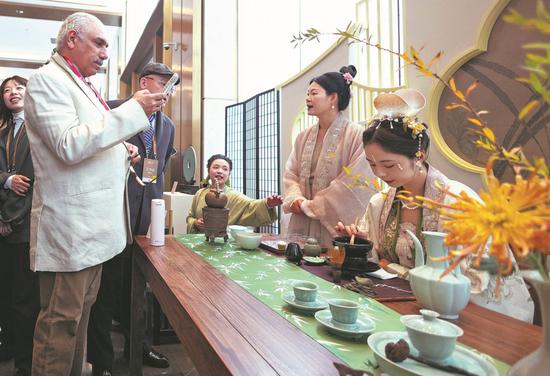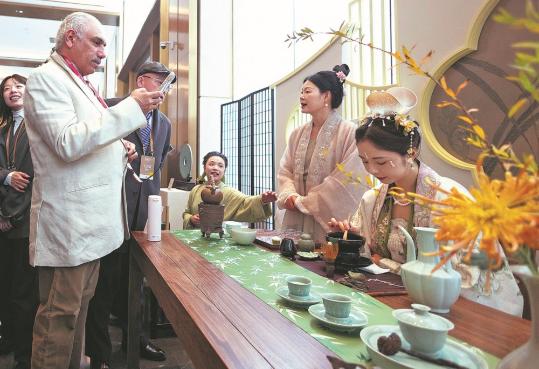Exceptional creativity can bind nations

Tea artists demonstrate the Jingshan tea ceremony, a traditional tea-making technique, to attendees of the second Liangzhu Forum in Hangzhou, capital city of Zhejiang province, on Monday. (Photo by Dong Xuming/For China Daily)
To promote national culture and foster exchanges with cultures worldwide, nations must first create exceptional artistic works, experts said at the second Liangzhu Forum, which opened on Monday in Hangzhou, Zhejiang province. They stressed that only outstanding cultural achievements will attract global attention.
"The idea that 'what is national is also international' has been proposed for a long time. Personally, I believe this statement holds true," said Ye Xiaogang, chairman of the China Musicians Association and founding dean of the School of Music at the Chinese University of Hong Kong in Shenzhen, Guangdong province.
"This is because the music culture created by each nation is unfamiliar to others around the world. If the music of a particular nation is truly remarkable and capable of expressing the genuine thoughts and profound spiritual insights of that nation — its understanding and feelings toward humanity, nature and society — then that national music is certainly international," Ye said.
With the theme "Exchanges and Mutual Learning for a New Model for Human Advancement", the forum welcomed over 300 participants, including archaeologists, writers and musicians, from more than 60 countries and regions.
"I am convinced that the richest cultures are those that engage in dialogue with others. We exist because others exist. So, we need others to know who we are," said Santiago Gamboa, minister counselor and cultural attache at the Embassy of Colombia. "This idea is central to the conversations at the forum, bringing together representatives of diverse cultures from around the world."
Mai Jia, a Mao Dun Literature Prize winner and vice-chairman of the China Writers Association, highlighted the growing global influence of Chinese literature during his presentation at the main forum.
"In fact, it is not difficult to notice that over the past decade or so, the status of Chinese literature in the world has almost suddenly risen. Mo Yan won the Nobel Prize in literature, Liu Cixin won the Hugo Award, and so on," he said. "Today, China has a presence, footprint and influence in every corner of the world. Literature, as the most accessible way for people to understand a country and a nation, has thus enjoyed good fortune and garnered significant attention."
Mai noted the attendance of prominent writers and critics at the forum, including leaders of influential literary magazines.
"These people do not come here casually. I believe they are drawn to China and to Liangzhu. The 5,000-year-old civilization of Liangzhu, with its long history and profound cultural heritage, is attracting them," he said.
Liangzhu Culture, a late Neolithic archaeological culture around Taihu Lake in the lower Yangtze River region, dates back approximately 5,300 to 4,300 years. On July 6, 2019, the Archaeological Ruins of Liangzhu City were inscribed on the World Heritage List.

